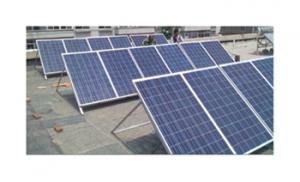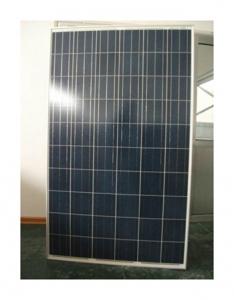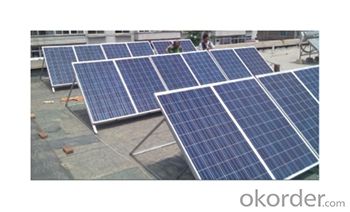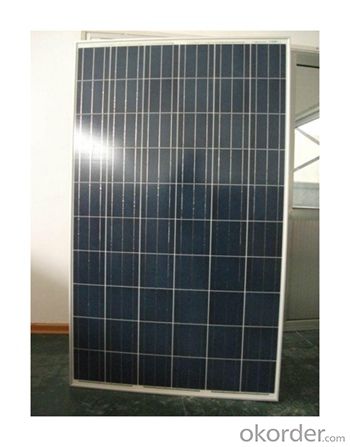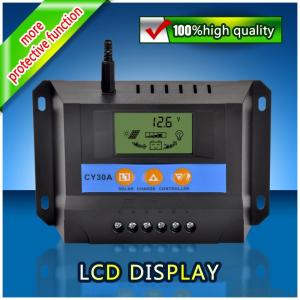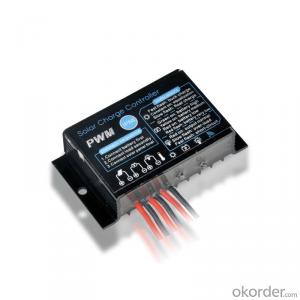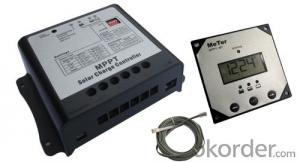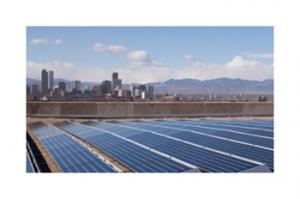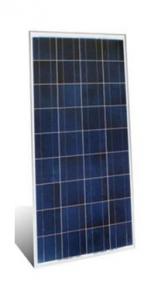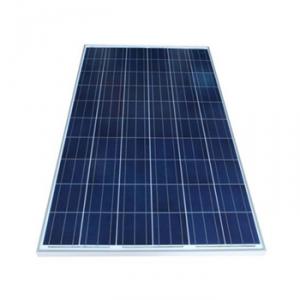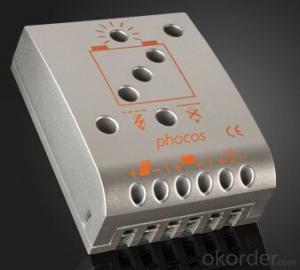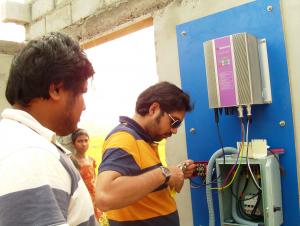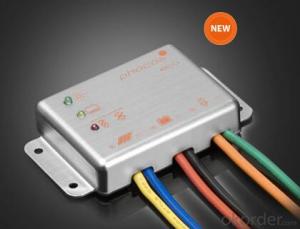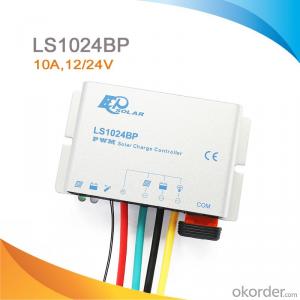OEM Solar MPPT Charge Controllers for Poly-Crystalline 230W 156*156 Solar Modules
OKorder Service Pledge
OKorder Financial Service
You Might Also Like
Solar Module Descriptions:
Solar Power Modules (known as Photovoltaics - PV) can generate electricity for your home or business, either as part of a stand-alone solar power system, or for buildings already connected to the local electricity network.
PV systems use the most abundant energy source on the planet, solar radiation, to generate electricity. They are silent, consume no fuel and generate no pollution. They also contribute to the reduction of greenhouse gas emissions; a 2kW PV system on a house will prevent the emission of about 40 tonnes of CO2 during its projected 30 year lifetime. Furthermore, the use of PV will reduce your electricity bills and exposure to fluctuating and steadily rising electricity prices.
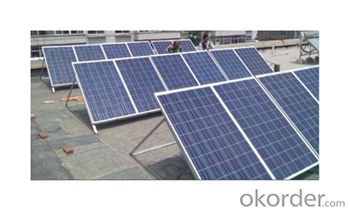
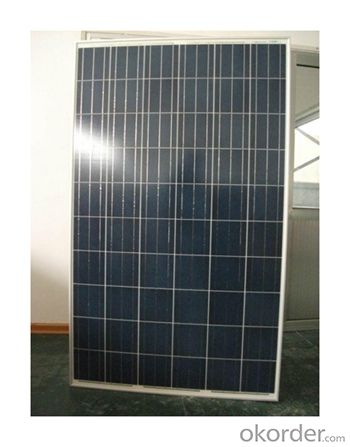
Electrical Characteristics
Max-power (W) | 230 |
Max-Power Voltage (V) | 29.50 |
Max-Power Current (A) | 7.80 |
Open-Circuit Voltage (V) | 36.80 |
Short-Circuit Current (A) | 8.28 |
Mechanical Characteristics
Cable type, Diameter and Length | 4mm2, TUV certified, 1000mm |
Type of Connector | Compatible with MC4 plug |
Arrangement of cells | 6*10 |
Cell Size | 156*156 |
Dimension | 1580*1069*45 |
Weight | 19.5Kg |
Glass, Type and Thickness | High Transmission, Low Iron, Tempered Glass 3.2mm |
Features
Guaranteed positive tolerance 0/+5w ensures power output reliability
Strong aluminum frames module can bear snow loads up to 5400Pa and wind loads up to 2400Pa.
Excellent performance under low light environments (mornings evenings and cloudy days)
12 years for product defects in materials and workmanship and 25 years for 80% of warranted minimum power.
Certifications and standards: IEC 61215.
Manufactured according to International Quality and Environment Management System (ISO9001, ISO14100).
FAQ
Q: What kind of loads can I run on PV?
With a correctly designed PV system you can power almost any electrical load. However, as the load size increases the expense also increases. Loads like hot water heaters, air conditioners, room heaters and electric stoves should be avoided. The added cost of trying to power loads like these is very cost prohibitive. If these loads have to be powered it will be a lot less expensive to change the appliance to use an alternative fuel type like propane.
Q: What is PV & how does it work?
PV stands for photovoltaic. Photo = Light and Voltaic = Electricity. A solar cell converts light to electricity.
A solar cell is made of silicon. Computer chips are made of this same material. Basically, when light strikes the surface of a solar cell some of it is absorbed into the silicon. This light energy bumps the electrons loose and causes energy to flow.
By packaging approximately 36 solar cells together a solar panel or a solar module is created. When you have more then one solar panels you create a solar array.
- Q: Can a solar controller be used in extreme weather conditions?
- Yes, a solar controller can be used in extreme weather conditions. Most solar controllers are designed to withstand a wide range of weather conditions, including extreme heat, cold, rain, and humidity. However, it is important to ensure that the solar controller is rated for the specific weather conditions it will be exposed to, and proper installation and maintenance procedures should be followed to ensure optimal performance and longevity in extreme weather.
- Q: Can a solar controller be used with solar panel sun tracking systems?
- Solar panel sun tracking systems can indeed utilize a solar controller. The primary function of a solar controller is to regulate the voltage and current from the solar panels to ensure the batteries are charged correctly or electrical devices are powered efficiently. Its role also involves monitoring the input from the solar panels and adjusting the output accordingly to safeguard the system against overcharging or overloading. In the context of solar panel sun tracking systems, the solar controller assumes a critical role in managing the power generated by the panels. These systems employ sensors and motors to constantly adjust the position of the solar panels throughout the day, ensuring they are optimally oriented towards the sun to receive maximum sunlight exposure. Consequently, the voltage and current output from the panels may fluctuate depending on their positioning. The solar controller takes these variations into account and optimizes the charging or power supply accordingly. It consistently monitors the input from the solar panels, adjusts the charging parameters, and regulates the output to ensure the proper charging of batteries or efficient powering of electrical devices. The utilization of a solar controller with solar panel sun tracking systems is highly recommended as it contributes to maintaining the overall performance and longevity of the system. By ensuring that the solar panels are operating at their maximum potential, it facilitates the maximization of energy output and enhances the system's overall efficiency.
- Q: What is the size and weight of a typical solar controller?
- The size and weight of a typical solar controller can vary depending on the specific model and manufacturer. However, most solar controllers are relatively compact and lightweight. On average, a typical solar controller may have dimensions of around 5-7 inches in length, 3-4 inches in width, and 1-2 inches in height. In terms of weight, they typically range from 0.5 to 1 pound. These dimensions and weights make solar controllers easy to install and integrate into solar power systems without taking up much space or adding excessive weight.
- Q: Can a solar controller be used with solar-powered water pumps?
- Yes, a solar controller can be used with solar-powered water pumps. A solar controller helps regulate the voltage and current from the solar panels to ensure optimal charging and protection of the batteries. It can also control the operation of the pump, allowing it to start and stop based on the available sunlight and water demand.
- Q: Can a solar controller handle varying environmental conditions?
- Yes, a solar controller is designed to handle varying environmental conditions. It is built to withstand extreme temperatures, humidity, and other environmental factors commonly found in outdoor settings. Additionally, solar controllers are equipped with protective features to ensure reliable operation and longevity in different environmental conditions.
- Q: How does a solar controller handle variations in ambient light conditions?
- A solar controller is designed to efficiently regulate and optimize the charging process of a solar panel system based on ambient light conditions. It uses advanced technology and algorithms to handle variations in light intensity and adjust the charging parameters accordingly. One of the primary functions of a solar controller is to monitor the voltage and current generated by the solar panels. When there is sufficient sunlight, the controller detects a higher voltage and current, indicating optimal charging conditions. In response, it adjusts the charging parameters to allow maximum power transfer from the panels to the battery, ensuring efficient charging. However, as ambient light conditions change, the solar controller needs to adapt to ensure the system's optimal performance. During low light conditions, such as cloudy or overcast days, the controller detects a drop in voltage and current. In such cases, it reduces the charging parameters to prevent overcharging the battery, which could lead to damage or reduced lifespan. Conversely, during periods of high light intensity, such as sunny days, the controller detects an increase in voltage and current. To prevent overloading the battery, it adjusts the charging parameters to limit the amount of power transferred, ensuring the battery is charged safely and efficiently. Furthermore, a solar controller may also incorporate additional features like temperature compensation to handle variations in ambient temperature. As temperature affects the charging process, the controller adjusts the charging parameters accordingly to compensate for temperature fluctuations and maintain optimal charging conditions. In summary, a solar controller effectively handles variations in ambient light conditions by continuously monitoring and adjusting the charging parameters based on the voltage and current generated by the solar panels. This ensures that the solar panel system operates efficiently, maximizes power transfer, and protects the battery from overcharging or other potential issues.
- Q: Can a solar controller be used with a solar-powered healthcare facility?
- Yes, a solar controller can be used with a solar-powered healthcare facility. A solar controller is responsible for regulating and optimizing the charging process of solar panels, which can help maintain a consistent and efficient power supply to the facility. This is crucial for ensuring uninterrupted and reliable operation of medical equipment, lighting, and other essential systems in a healthcare facility.
- Q: Can a solar controller be used with a solar-powered public transportation facility?
- Yes, a solar controller can be used with a solar-powered public transportation facility. A solar controller helps regulate the charging and discharging of batteries in a solar power system, ensuring efficient and safe operation of the facility. It helps monitor and manage the energy flow, optimize power usage, and protect the batteries from overcharging or discharging. Therefore, implementing a solar controller is essential for maintaining the reliability and performance of a solar-powered public transportation facility.
- Q: How does a solar controller handle battery capacity testing and calibration?
- The management of battery charging and discharging in a solar power system is overseen by a solar controller. To conduct battery capacity testing and calibration, the solar controller utilizes several important techniques. First and foremost, battery capacity testing is performed by the solar controller. This involves discharging the battery in controlled conditions to ascertain its real capacity. The controller may periodically conduct this test to evaluate the battery's well-being and ensure accurate monitoring of its capacity. Throughout the test, the solar controller accurately calculates the battery's capacity by monitoring its voltage, current, and temperature. Moreover, the solar controller often incorporates features for battery capacity calibration. This allows the controller to adjust its charging and discharging algorithms based on the battery's actual capacity. By calibrating the system to match the battery's true capacity, the solar controller can optimize the charging process, prevent overcharging or undercharging, and prolong the battery's lifespan. Calibration may involve modifying charge and discharge thresholds, compensating for temperature fluctuations, and fine-tuning charging parameters to align with the battery's unique characteristics. To effectively handle battery capacity testing and calibration, a solar controller typically requires precise voltage and current sensors, as well as temperature sensors to monitor the battery's conditions. These sensors assist the controller in collecting the necessary data for testing and calibration, ensuring accurate and reliable measurements. It is important to note that the specific methods and features for battery capacity testing and calibration may vary among different solar controller models and manufacturers. In conclusion, a solar controller manages battery capacity testing and calibration by utilizing battery capacity testing procedures to evaluate the battery's health and accurately determine its capacity. The controller also integrates calibration features to adjust charging and discharging algorithms based on the battery's actual capacity, optimizing the system's performance and extending the battery's lifespan.
- Q: Can a solar controller be used with a solar-powered museum or gallery?
- Yes, a solar controller can be used with a solar-powered museum or gallery. A solar controller is an essential component of a solar power system that manages the flow of energy between the solar panels, batteries, and electrical loads. It helps regulate the charging and discharging of batteries, ensuring optimal performance and preventing overcharging or damage. In a solar-powered museum or gallery, a solar controller would play a crucial role in maintaining a stable and efficient power supply, maximizing the utilization of solar energy, and ensuring the longevity of the system.
Send your message to us
OEM Solar MPPT Charge Controllers for Poly-Crystalline 230W 156*156 Solar Modules
OKorder Service Pledge
OKorder Financial Service
Similar products
Hot products
Hot Searches
Related keywords
